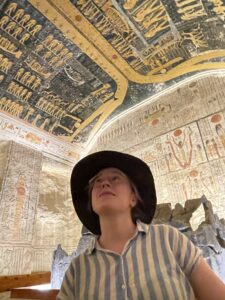What Are the Job Opportunities for Students with Anthropology Degrees?
My parents have been very supportive of my decision to study anthropology in college. They love the idea of me pursuing my dream of becoming a curator in a museum but they also helped me focus on all of the other career opportunities for anthropology majors.
In the past, most professional anthropologists taught or did research in colleges or universities, but now there are lots of other career options for anthropologists. Many anthropologists with master’s degrees or bachelor’s degrees work for independent archaeology firms doing studies at archaeological sites. They work in physical anthropology laboratories, and in museums in a wide range of areas. In addition, many anthropologists are hired by employers to do social science research. While a doctorate is required for most academic jobs. The nonacademic employment of anthropologists has been expanding as the demand for research on human behavior increases. Since 1985, over half of all new PhDs in anthropology have taken nonacademic positions in research institutes, nonprofit associations, government agencies, world organizations, and private corporations. While the job market for academic anthropologists is relatively steady, demand for anthropologists is increasing in other areas, stimulated by a growing need for analysts and researchers with sharp thinking skills who can manage, evaluate, and interpret the large volume of data on human behavior.
Academic Anthropology Careers.
On college campuses across the country, anthropologists teach and conduct research. They spend a great deal of time preparing for classes, writing lectures, grading papers, working with individual students, composing scholarly articles, and writing longer monographs and books. A number of academic anthropologists find careers in other departments or university programs, such as schools of medicine, epidemiology, public health, ethnic studies, cultural studies, community or area studies, linguistics, education, ecology, cognitive psychology, and neural science.
Corporates, Nonprofit, and Federal, State, and Local Government Anthropology Careers.
Anthropology graduates work in a wide range of positions in companies, government, and nonprofit organizations. I’ve discovered that most of the positions that are well suited for anthropology majors don’t mention the word anthropology in the job description. Instead, these positions are described to attract researchers, evaluators, and project managers. The unique training and perspective anthropology majors have enables them to be very successful in these jobs. Non-governmental organizations, like international health organizations and development banks, hire anthropologists to help design and implement a wide variety of programs in the United States and around the world. State and local governmental organizations hire anthropologists to assist with planning, research, and managerial capacities.
Many corporations look specifically for anthropologists, recognizing the value of their perspective on a corporate team. In the last 40 years, contract archaeology has been a growth occupation because of state and federal legislative mandates to understand the impact on cultural resources affected by government-funded projects. Forensic anthropologists work with law enforcement agencies to help identify unknown remains but also work in university and museum settings. Companies like Google and Facebook hire corporate anthropologists to help with market research by conducting targeted focus groups to examine consumer preference patterns not readily apparent through statistical or survey methods.




